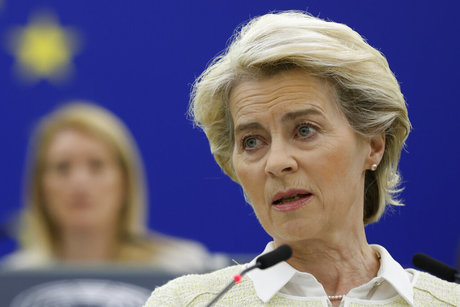EU members wrangle with Hungary over Russian oil ban

European diplomats were locked in difficult negotiations Friday to agree a new package of sanctions against Russia, with Hungary opposed to a ban on Russian oil imports.
Negotiators expect the talks to continue until Sunday, but remain hopeful of a compromise.
Brussels wants to introduce a sixth raft of sanctions against Moscow to increase the cost of its invasion of Ukraine and wean Europe's economy off a dependence on Russian energy supplies.
But Hungary and Slovakia, landlocked and dependent on crude from a Russian pipeline, are resisting the oil embargo and holding up the approval of the package.
"It's not easy to establish unity," admitted European Commission President Ursula von der Leyen, addressing a policy conference organized by the German daily Frankfurter Allgemeine Zeitung.
"The countries that are now hesitating are not yet ready. We are sitting together with these countries in Brussels to work out pragmatic things, such as getting alternative oil to these countries.
"I am confident we will get this package on its way, if it takes a day longer, then it will take a day longer."
EU foreign policy chief Josep Borrell said that if there was no agreement over the weekend he would call a meeting of EU foreign ministers next week.
Hungarian Prime Minister Viktor Orban declared the oil ban would cross a "red line" for Budapest.
"The European Commission president, intentionally or unintentionally, has attacked the European unity that had been worked out," he told state radio.
Diplomats in Brussels thought that a compromise could be found, but warned that Orban was using the May 9 Europe Day, celebrating the genesis of the EU, as a lever.
"The approach by the Hungarians in the room is very different from what you are hearing from Orban in Budapest," one said. "This will go into the weekend for technical work, not political."
Monday will also be celebrated with great pomp in Russia, when it holds its Victory Day commemorating its World War II triumph over the Nazis.
Brussels hopes to rain on President Vladimir Putin's parade with the new sanctions package.
For the sanctions to go into effect, all 27 EU members must give their unanimous approval.
- Longer transition -
The plan, drawn up by the commission and submitted to member states on Wednesday as a document that could yet be modified, would halt Russian crude oil imports into the EU within six months and refined oil products by the end of the year.
Hungary and Slovakia, however, would be given an extension allowing them to keep importing until the end of 2023. But they say that is not enough, while the Czech Republic has asked to be given the same extension.
According to diplomats, on Friday the negotiators were discussing extending the transition for those three until the end of 2024.
One member state said the discussion was going from talking about delays for some "to a request for exemptions, which pushes the envelope a little too far".
There is also a disagreement over whether to add the head of the Russian Orthodox Church, Patriarch Kirill, a close Putin ally, to the EU's targeted sanctions list. His name was in the commission's draft.
The package also targets Moscow's financial sector, with a plan to kick Russia's largest bank, Sberbank, off the SWIFT messaging system which facilitates transfers between institutions.
Three Russian TV channels will be banned from broadcasting in the EU, according to the document seen by AFP.



